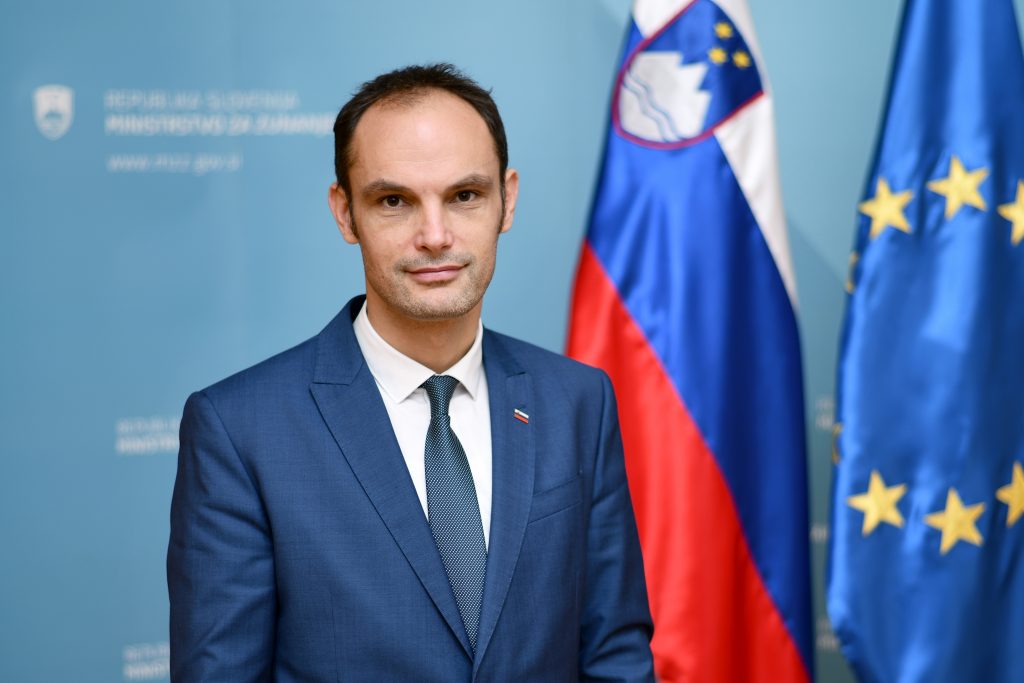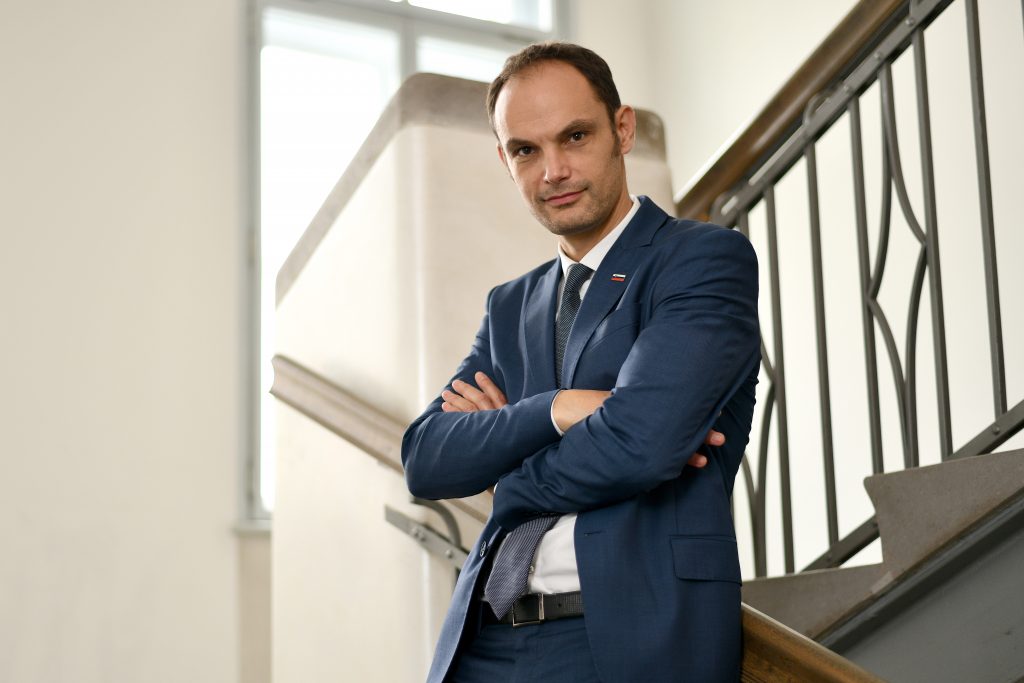Slovenia supports Serbia on its path to the EU. The relations between our two countries are very dynamic and diversified, and good bilateral cooperation exists in practically all fields
To accelerate relations that are already moving fast in all directions is a hard-to-impossible task. Besides what we have been doing in the last few years, we should look into new industries to cooperate in, such as green economy solutions, energy efficiency, e-mobility, and solutions for the fourth industrial revolution. I believe personal contacts push cooperation forward, and on that field, between Slovenia and Serbia, we have nothing to be fearful about.

You took over as Foreign Minister a few months ago. What are your priorities for the coming period?
Slovenia will have an important opportunity to improve its reputation and raise its profile during its second Presidency of the Council of the EU in the second half of 2021. Future activities will focus on preparations for the Presidency – both in terms of defining our main priorities and designing activities to promote Slovenia. To address the challenging circumstances of the COVID-19 pandemic, our first priority, and one of Slovenia’s main goals, will be to co-shape a stronger and more resilient EU that is able to respond even more effectively to crises in the future. In addition to the green and digital transition, which is the key to post-COVID economic transformation, important attention will be given to the rule of law and maintaining the European way of life. Understandably, the Slovenian Presidency will also have an external dimension, emphasising continued and even stronger engagement with the countries of the Western Balkans, which is one of the key regions both for Slovenia and for the EU.
When will the country’s priorities and programme be presented?
Preparations for the Presidency of the EU Council in the second half of 2021 are in full swing. In June, the EU Council adopted the 18-month Trio programme, prepared jointly by Germany, Portugal and Slovenia. Reflecting the objectives of the EU Strategic Agenda and including all relevant aspects related to COVID-19 and the social and economic recovery from the pandemic, it represents a common foundation for the six-month Presidency programme. Our six-month national programme, which is currently being prepared in Slovenia, will be published and publicly announced a few days before the start of our Presidency on 1 July 2021. This is common practice of all Member States holding the Presidency of the EU, for one simple reason: not to interfere with the priorities of the on-going Presidency, which at that time will be held by Portugal. In this sense, we will strive for as coordinated and smooth a transition between the two Member States as possible.
What kind of challenges has Europe in lockdown been facing during the pandemic and what do you think awaits us next year?
The key challenge for the EU in the early stages of the pandemic was the question of how to effectively coordinate the measures designed to curb the spread of the virus. Many of the decisions that Member States adopted at that time, such as restrictions on the internal borders of the EU, had a significant impact both on the functioning of the EU’s single market and on the fundamental freedoms of EU citizens. Despite some initial difficulties, the Union managed to establish an effective modus operandi that helped Member States cope with this massive challenge not only in terms of their health systems, but also the normal functioning of their economies.
“Serbia is an important political and economic partner in the region, and we also see it as a future counterpart within the EU”
The first lockdown had a significant impact on Europe’s economy, and I expect that the current restrictions will pose additional obstacles to successful economic recovery in 2021. Here, two important elements will feature in Europe’s recovery: firstly, I expect rapid deployment of the funding from the Multiannual Financial Framework and the Recovery Fund to help Member States overcome the economic downturn caused by COVID-19. Secondly, the roll-out of the vaccine will be a game changer in our fight against the pandemic. Here, I should underline the importance of the strategic foresight of the European Commission, which started with activities related to vaccines early enough – at the beginning of the COVID-19 spread. Thanks to that, we are now on the verge of successful deployment of an effective vaccine in the EU.
What kind of foreign policy strategy will Slovenia pursue in the coming years, both towards the EU and the Western Balkans region?
Slovenia intends to continue supporting all efforts to strengthen the EU after being faced with challenges such as the COVID-19 pandemic, terrorism, and migration. Because of our close geographical proximity and historic ties, the Western Balkans represents Slovenia’s natural economic and security hinterland. We will continue to pursue the goal of strengthening and deepening relations with the countries of the region, deepening regional cooperation between them and supporting the convergence and integration of the WB countries into Euro-Atlantic cooperation.
Slovenia aims at ensuring stability, progress with reform, sustainable economic development and strengthening of regional political dialogue with the goal of lasting reconciliation, including in the context of promoting comprehensive cooperation between the countries of the region. Our activities will continue to focus on promoting good neighbourly relations. Slovenia believes strongly in the importance of the effective resolution of outstanding bilateral issues and strengthening of inclusive regional cooperation.

The ultimate objective of Slovenia’s activities in the region will be to create a favourable environment in the Western Balkans. We stress that the EU should actively help the region to bridge the development gap and improve the socio-economic situation. A common goal should be to improve the connectivity within the region and between the region and the EU in all aspects. Slovenia believes that the most valuable tool to assure the stability and progress of the region is a credible EU enlargement policy. Therefore, the WB will be one of priorities of our Presidency of the Council of the EU.
Serbia and Slovenia have strong economic and bilateral relations. What is crucial for the two countries in terms of nurturing this good, long-standing relationship?
On 9 December, we will celebrate the 20th anniversary of the establishment of diplomatic relations between our two countries and throughout that time, we have had good and friendly relations.
We have boosted economic cooperation and cultural exchange, and intensified mutual understanding. Both countries have agreed to step up efforts to implement more elements of the Agreement on Succession Issues. For Slovenia, the effective resolution of succession issues is of crucial importance. All this reflects the friendly relations between us. I personally believe that there are still areas in which we can improve our cooperation.
Prior to the pandemic, Slovenia and Serbia had truly comprehensive relations. We had annual joint governmental sessions, frequent meetings on the ministerial level, and working groups. Slovenia also established a true regional leaders meeting, the so-called Brdo Process, which developed into the Brdo-Brioni Process. This initiative’s political agenda was supported by regional expert working groups and meetings, the purpose of which was to follow up on the actions agreed at the leaders’ level. We can be proud of the initiative, since its framework and the core purpose of regional ownership was taken over by the Berlin Process and the WB6. Besides the multilateral and bilateral relations, we should also point out Slovenia’s sincere, supportive involvement in the processes for Serbia’s EU integration. We are a true advocate of Serbian integration into the EU and we do everything within our power to facilitate that. It has been confirmed time and time again that Serbia belongs in the European family. There is no need to repeat that: the only thing we want to talk about now is how this can be achieved and when.
“I occasionally see disagreements occur due to false or unrealistic expectations. That is why we need to talk openly. We have already built the trust among ourselves”
The pinnacle of the excellent bilateral relations was seeing the two governments hold joint sessions. Is there a chance to hold it next year?
Serbia and Slovenia have established regular, we might even say, traditional joint governmental meetings, which have had a positive effect on the strengthening of cooperation in all areas, promoted closer inter-governmental ties and enabled effective identification of joint projects and goals. Serbia is the only country in the region with which Slovenia holds regular meetings of this type; there have been five of them so far. Our intention is to continue with this practice of cooperation. This format, combining ministers and businesspeople, is, in my opinion, a good starting point for building closer ties with your new government.
What is crucial for our good, long-standing relationship: personal trust between us (political leaders) and friendship, mutual respect among Slovenians and Serbs, and addressing all potential challenges in favour of mutual interests and benefits.
What efforts is Slovenia making to increase the volume of Serbian investments in Slovenia?
Slovenia has always been open to foreign investment, including from Serbia. I am glad they have been increasing in both directions lately. It is important to emphasise that the dialogue between governmental bodies and foreign investors is of crucial importance in the first stage and can give a boost to business projects. We all need to be aware of who is doing what and help each other achieve the best possible results. Again, open dialogue is something we prefer over media coverage and gossip.
Slovenia’s Agency for the promotion of investments – SPIRIT is doing a great job facilitating the investors, as well as the Ministry for Economic Development and Technology, which is always open to new business projects and is there to support great business ideas. Moreover, our economic diplomacy with the network abroad, which is coordinated by the Foreign Ministry, is there from the first contact to liaising between foreign companies and domestic institutions, as well as in the post-investment activities.
Future cooperation
How can the current cooperation between the two countries become even better?
There are still plenty of untapped veins of economic cooperation, of cultural and scientific exchange; in education, we would like to facilitate interaction between students; the succession process itself could be intensified and Serbia is Slovenia’s valued partner in this respect. Our cooperation in regional and multilateral framework could be strengthened as well. I believe that to achieve more and advance further, we need to clear our tables of any historical burden. It is not only up to us when it comes to implementation of the Agreement on the succession after Yugoslavia, but still, a lot could already have been resolved between our two governments. As I am aware, there are also some long-lasting judicial proceedings between our two countries over the already agreed succession formula and financial claims. We should be wise enough to end such proceedings and move on.